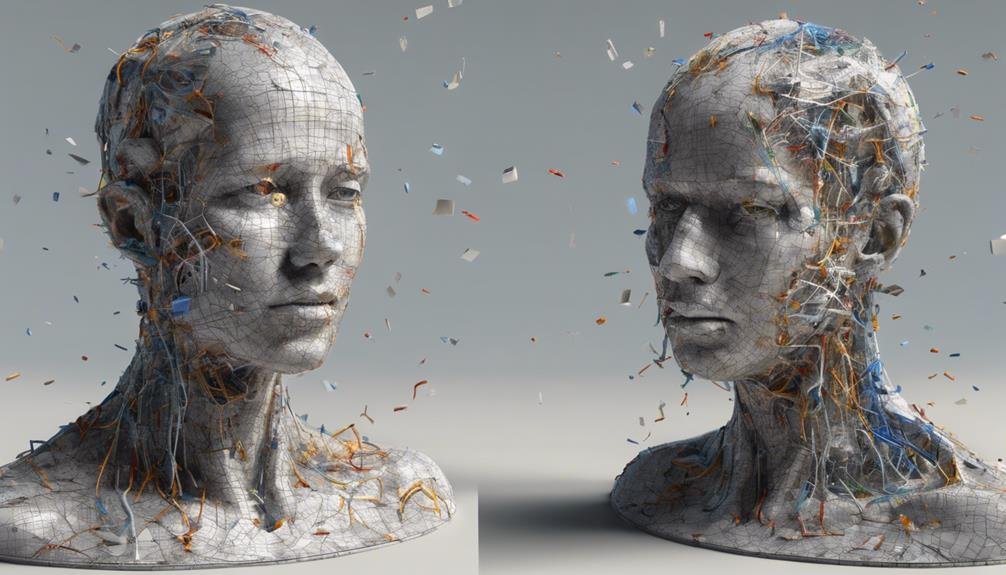Freud’s Structure of the Mind: Id, Ego, and Superego
Have you ever considered the mind as a battleground where primal instincts clash with societal norms and moral values? Freud's id, ego, and superego framework explores the complexities of human behavior, shedding light on the intricate interplay between instinctual desires and conscious decision-making processes. As you investigate the depths of Freud's structural model, you'll uncover the fascinating dynamics that shape our thoughts, emotions, and actions, offering a unique perspective on the inner workings of the human psyche.
Key Takeaways
- Id represents primal desires for instant pleasure.
- Ego balances instincts and societal norms.
- Superego internalizes moral values and societal norms.
- Interplay of id, ego, and superego influences behavior.
- Defense mechanisms protect from distressing thoughts.
Sigmund Freud's Contributions
Sigmund Freud revolutionized the field of psychology with his groundbreaking theories on the structure of the mind. His Freudian legacy continues to have a profound psychological impact on how individuals perceive their thoughts and behaviors.
Freud's concepts of the id, ego, and superego have shaped modern psychology, influencing the way therapists approach understanding human behavior.
Freud's theories have had significant cultural implications as well. His emphasis on the unconscious mind and childhood experiences has seeped into various aspects of society, from literature to film. Freudian theory has permeated popular culture, providing a framework for interpreting human motivations and desires.
The enduring legacy of Freud's work highlights the enduring relevance of his ideas. Despite criticism and evolving psychological perspectives, Freud's contributions to the field remain significant.
His exploration of the unconscious mind and the intricate interplay between different aspects of the psyche continues to spark debates and shape contemporary psychology.
The Id: Unconscious Desires
The Id, as proposed by Freud, represents the unconscious part of your mind where primal desires reside. It's driven by the pursuit of immediate pleasure and gratification, operating solely based on instinctual drives and urges.
Understanding the workings of the Id sheds light on the raw, unfiltered aspects of human behavior that influence decision-making and emotional responses.
Unconscious Primal Desires
Exploring the depths of the mind reveals a complex interplay of unconscious primal desires, driving human behavior beyond conscious awareness. Repressed memories and childhood trauma often serve as the foundation for these deep-seated desires that reside within the Id. These memories, buried in the unconscious, can shape one's subconscious motivations and lead to psychological conflicts.
Freud believed that the Id operates on the pleasure principle, seeking immediate gratification without considering the consequences. These primal desires are raw, unfiltered, and impulsive, representing the instinctual part of the mind. They often clash with societal norms and the moral standards set by the superego, causing inner turmoil and conflict.
Understanding these unconscious primal desires is essential in psychoanalysis, as they provide insights into one's behavior, motivations, and emotional responses. By delving into the murky depths of the Id, individuals can unravel the complexities of their psyche and work towards resolving inner conflicts rooted in repressed memories and childhood traumas.
Immediate Pleasure Seeking
Delving into the depths of the mind reveals a primal urge for immediate pleasure, a driving force governed by the Id's relentless pursuit of gratification. The Id, operating purely on the pleasure principle, seeks instant gratification without concern for consequences or morality. This hedonistic pursuit of pleasure is rooted in the unconscious mind, where desires and impulses reign supreme.
The Id drives individuals to seek immediate satisfaction of their most basic needs and urges. It craves pleasure and seeks to avoid pain at all costs, often leading to impulsive and irrational behaviors. This primal part of the psyche operates on raw instincts, demanding fulfillment without delay.
The quest for instant gratification can manifest in various ways, such as indulging in excessive eating, impulsive spending, or engaging in risky behaviors. The Id's influence can be overwhelming, overpowering rational thought and decision-making processes.
Understanding this aspect of the mind sheds light on the complexities of human behavior and the constant tug-of-war between immediate pleasure seeking and long-term fulfillment.
Instinctual Drives and Urges
In the domain of the mind's deepest layers lie instinctual drives and urges, the primal forces that propel human behavior. Basic instincts, primal urges, natural impulses, and innate drives are all components of the Id, the unconscious part of the mind according to Freud's psychoanalytic theory.
These instinctual drives are raw and unfiltered, seeking immediate gratification without concern for consequences or societal norms. The Id operates on the pleasure principle, demanding satisfaction for desires without delay. It's driven by impulses that are present from birth, reflecting the primal nature of human beings.
These instinctual drives and urges are often in conflict with the constraints imposed by the Ego and Superego, leading to internal tension and psychological struggles. Understanding and acknowledging these innate drives can offer insights into human behavior and motivations that may not be immediately apparent.
The Ego: Mediator of Reality
The Ego serves as the essential mediator between the primal instincts of the Id and the moral constraints imposed by the Superego, guiding your perception of reality and maintaining a delicate balance between desire and societal norms.
It's through the Ego that you navigate the external world, utilizing self-control strategies to satisfy the demands of both the Id and Superego. Your Ego acts as a rational decision-maker, weighing the consequences of your actions while considering the ethical implications set by societal standards.
In your daily life, the Ego filters the impulses of the Id and the moral ideals of the Superego, allowing you to make decisions that align with both your desires and the expectations of those around you.
The Superego: Internalized Morality
Your journey into understanding Freud's structure of the mind leads you to the Superego – the internalized moral compass.
This aspect of the psyche is where societal and parental values reside, shaping your sense of right and wrong.
Exploring how the Superego influences your conscience and feelings of guilt reveals the intricate workings of your internalized morality.
Moral Compass Development
Moral compass development, rooted in the formation of the superego, encompasses the internalization of societal norms and values within the individual psyche. This process is essential for moral development and ethical decision-making.
As you move through life, your superego acts as a guiding force, shaping your understanding of right and wrong based on societal standards. Through interactions with caregivers, peers, and society, you internalize these moral principles, which then influence your thoughts, behaviors, and choices.
Your superego serves as a critical component in your moral compass, helping you differentiate between acceptable and unacceptable actions. It acts as a regulator, evaluating your decisions in alignment with societal norms.
This internalized morality influences your ethical decision-making, prompting you to reflect on the consequences of your actions on both yourself and others. By integrating these societal values into your superego, you develop a framework for maneuvering through complex moral dilemmas and upholding ethical standards in various situations.
Conscience and Guilt
How does the superego influence the development of conscience and guilt within an individual's psyche?
The superego, as Freud conceptualized, acts as the moral component of one's mind, internalizing societal and parental values. It plays an important role in shaping an individual's sense of right and wrong, influencing the development of conscience and guilt. When faced with moral dilemmas or ethical decisions, the superego draws upon these internalized morals to guide behavior and evoke feelings of guilt when one acts against them.
Conscience, often associated with the superego, serves as a mechanism that evaluates actions based on these internalized moral standards. It functions as a self-regulatory process, prompting individuals to reflect on their behavior and make choices aligned with their moral values.
Guilt, on the other hand, arises when the superego perceives a violation of these moral principles, leading to feelings of remorse or self-blame.
Interplay of Three Forces
The interplay of the id, ego, and superego in Freud's structure of the mind is a complex dynamic that shapes human behavior and personality. Psychological conflicts arise from the constant interaction of these three forces within the psyche.
The id, driven by primal instincts and desires, often clashes with the superego, which represents societal norms and moral values. This conflict between the id's immediate gratification and the superego's moral compass creates inner struggles that individuals must navigate.
Amidst these inner struggles, the ego acts as the mediator, working to balance the conflicting demands of the id and superego. It aims to satisfy the id's desires in a way that aligns with the superego's ethical standards.
When the ego successfully manages these tensions, individuals can exhibit socially acceptable behavior while still meeting their basic needs and desires.
Understanding the interplay of the id, ego, and superego sheds light on the complexities of human behavior and the intricate nature of psychological conflicts that shape individuals' personalities and actions.
Defense Mechanisms
Various defense mechanisms play an essential role in Freud's psychoanalytic theory as mechanisms individuals unconsciously employ to protect themselves from distressing thoughts and emotions. These coping mechanisms are pivotal for emotional regulation and maintaining mental health.
By utilizing defense mechanisms, individuals can manage anxiety and protect their self-esteem by unconsciously distorting reality. For example, denial allows individuals to reject the existence of unpleasant situations, while projection involves attributing one's undesirable traits to others. Rationalization is another defense mechanism where individuals justify their actions with logical reasoning to avoid guilt or anxiety.
Understanding these psychological defenses is critical in psychoanalytic theory as they provide insights into how individuals navigate challenging emotions and situations. While defense mechanisms serve a protective function, overreliance on them can hinder personal growth and self-awareness.
It's essential for individuals to develop healthy coping strategies and engage in self-reflection to maintain a balanced mental state. By recognizing and addressing the role of defense mechanisms in everyday behavior, individuals can work towards achieving greater emotional resilience and psychological well-being.
Psychosexual Development Stages
Psychosexual development stages, proposed by Sigmund Freud, outline the sequential progression of libidinal energy focusing on different erogenous zones during childhood. These stages include the oral, anal, phallic, latent, and genital stages.
The oral stage, occurring from birth to around 18 months, centers on pleasure derived from the mouth and can lead to an oral fixation in later life. The anal stage, from around 18 months to three years, involves the child gaining pleasure from bowel and bladder control.
One of the most controversial stages is the phallic stage, around three to six years, where the Oedipus complex emerges. In this stage, boys develop unconscious desires for their mothers and view their fathers as rivals. Similarly, girls experience the Electra complex, desiring their fathers and competing with their mothers.
Successfully progressing through these stages is essential for healthy psychosexual development and overall personality formation.
Psychological Disorders
Understanding the intricacies of psychological disorders requires a thorough exploration of their underlying causes and manifestations. Coping mechanisms play an essential role in how individuals manage these disorders. People develop various coping strategies to deal with the stress and challenges that come with psychological disorders.
Some coping mechanisms can be essential, such as seeking social support or practicing mindfulness, while others may be maladaptive, like substance abuse or avoidance behaviors. Cognitive distortions also contribute significantly to the experience of psychological disorders. These distortions are errors in thinking that can worsen symptoms and perpetuate negative thought patterns.
Common cognitive distortions include black-and-white thinking, catastrophizing, and personalization. Recognizing and challenging these distortions through cognitive-behavioral therapy can help individuals reframe their thinking and improve their overall mental health.
Contemporary Relevance
In today's fast-paced world, the concepts of id, ego, and superego proposed by Freud continue to hold relevance in understanding human behavior and motivations.
Modern applications of Freud's theory can be seen in various fields such as psychology, sociology, and even marketing. The id, representing primal urges and desires, is often linked to impulsive behaviors seen in consumer decision-making, while the ego's role in balancing these desires with reality is evident in personal conflict resolution strategies.
Practical implications of Freud's structure of the mind can also be observed in therapeutic settings where understanding the interplay between the id, ego, and superego can aid in addressing deep-rooted issues and promoting self-awareness. By acknowledging the influence of these three components in shaping thoughts, emotions, and actions, individuals can gain insights into their behaviors and motivations, leading to personal growth and development.
In essence, Freud's tripartite model continues to provide a valuable framework for comprehending the complexities of human nature in contemporary society.
Conclusion
To sum up, Freud's structure of the mind, encompassing the id, ego, and superego, remains a fundamental framework in psychology.
The intricate interplay of these three forces shapes human behavior, highlighting the delicate balance between primal urges and societal expectations.
Through the lens of Freud's theory, the complexities of the human psyche are illuminated, offering valuable insights into the internal conflicts and motivations that drive our actions.
Freud's framework continues to resonate in contemporary psychology, enriching our understanding of human nature.







